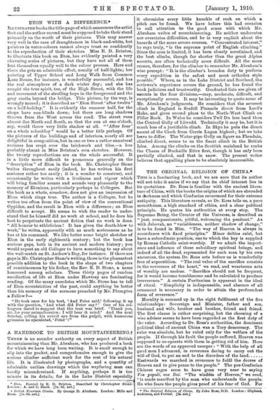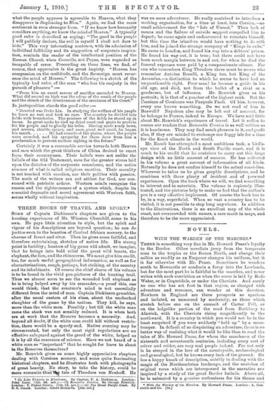THE ORIGINAL RELIGION OF CHINA.*
THIS is a fascinating book, and we are sure that its author will not take it amiss if we say that its chief interest lies in its quotations. Dr. Ross is familiar with the ancient litera- ture of China, with the books the origins of which are shrouded in darkness and which Confucius reverenced for their extreme antiquity. This literature reveals, so Dr. Ross tells us, a pure monotheism, a high standard of ethics, and a clear political principle. He quotes his authorities at every step. The Supreme Being, the Creator of the Universe, is described as "just, compassionate, pitiful, welcoming the penitent." As with Jehovah, no "variableness, neither shadow of change," is to be found in Him. " The way of Heaven is always in accordance with fixed principles." Minor deities exist, but have a subordinate position, one to which the key is supplied by Roman Catholic saint-worship. If we admit the import- ance and influence of these subsidiary spiritual beings, and indeed of all the dead, represented for each man by his own ancestors, the system Dr. Ross sets before us is wonderfully free of superstition. "The real value of the sacrifice consists in the reverence of the heart," we read, and wearisome acts of worship are useless. " Sacrifice should not be frequent, for it would become troublesome and be calculated to produce irreverence." A certain Puritanism is apparent in the ideal of ritual " Simplicity is indispensable, and absence of all ornament is necessary in order to attain the profoundest form of reverence."
Morality is summed up in the right fulfilment of the five relationships : Sovereign and Minister, father and son, husband and wife, brother and brother, friend and friend. The first clause is rather surprising, but the choosing of a wise adviser seems to have been regarded as the first duty of the ruler. According to Dr. Ross's authorities, the dominant political ideal of ancient China was a Tory democracy. The ruler was absolute, bat he raled only for the welfare of the people. If through his fault the people suffered, Heaven was supposed to co-operate with them in getting rid of him. Here are the words of an approved usurper : " With the help of all good men I advanced, in reverence daring to carry out the will of God, to put an end to the disorders of the land Eastwards we marched in reverence to fulfil the decree of Heaven and to give peace to the people." The pre-Confucian Chinese sages seem to have gone very near to saying Vox populi, vox Del. "The wisd6m of Heaven," we read, " ia made manifest by the man who understands the people. He who fears the people gives proof of his fear of God. For
• The Original Religion of China. By John Bose, D.D. London : Olipbant, Anderson. and Terrier. [5s. net.]
what the people approve is agreeable to Heaven, what they disapprove is displeasing to Him." Again, we find the same sentiment in even stronger form. " If we know how humanity considers anything, we know the mind of Heaven." A typically good ruler is described as saying : " The good in the people I will publicly declare, the evil in myself I shall not dare to hide." This very interesting sentence, with its admission of
individual fallibility and its suggestion of corporate inspira- tion, reminds the reader of the intellectual position of the
Roman Church when Councils, not Popes, were regarded as incapable of error. Proceeding on these lines, we find, of course, that oppression is the great impiety. "Heaven has compassion on the multitude, and the Sovereign must rever- ence the mind of Heaven." The following is a sketch of the typically bad ruler, of the man " who lost his majesty in the pursuit of pleasure"
"From him no sweet savour of sacrifice ascended to Heaven. What did ascend on high was the odour of the wrath of the people and the stench of the drunkenness of the creatures of his Court."
In juxtaposition stands the good ruler :— "Devoted was Duke Liu. In studying the welfare of his people he knew no rest and took no ease. The country he divided into fields with boundaries. The produce of the fields he stored up in barns. In great sacks he tied up dried meat and grain to provide for his people and to glorify his tribe. Having made raady bows, and arrows, shields, spears, and axes, great and small, he began his march He had examined the plains, where the people were crowded, and his sympathy for them drew from him a proclamation to prevent endless sighing in the future?'
Certainly it was a reasonable service towards both Heaven and men which the great thinkers of China desired to exact from their countrymen. Their beliefs were not unlike the beliefs of the Old Testament, save for the greater stress laid upon the dictates of the corporate conscience, and the entire absence of what is called religious emotion. Their morality is not touched with emotion, nor their politics with passion.
The souls of the writers are not athirst for God, nor con- sumed with patriotic ardour. Western minds recognise the reason and the righteousness of a system which, despite its essential dogmatic and moral agreement with Western faith, seems wholly without inspiration.















































 Previous page
Previous page